Cloud Gate Dance School (雲門舞集舞蹈教室) is not actually a dance school at all. Its aims extend far beyond teaching people to dance; in fact, according to the school’s director of research and development Hsieh Ming-fei (謝明霏), dance training is the least of her concerns. “It is about changing the physical culture of Taiwanese,” she said, speaking to the Taipei Times in a classroom at the school’s Guting branch. The school is celebrating its 15th anniversary this year, and has developed from being an oddity in the intensive education environment of Taiwan, to a hugely popular institution with students from age three to 73.
“When we were young, our education was very formal. Added to that, Chinese culture does not encourage physical contact, even between parents and children … As a dancer, even from a very young age, I became more comfortable with my own body and with physical contact, and I realized that physical communication is a very direct form of communication. Its expressive power can be much greater than words,” Hsieh said, a professional dancer who is now responsible for curriculum development at Cloud Gate Dance School.
“When I was young, people would often say ‘you dancers are very sui-bian (隨便),’ meaning that we hugged or kissed openly, but that really isn’t the point. Physical contact is a way of expressing love and concern for those you care about. Of course, things are changing now, but it is a gradual process. As dancers, we probably have a closer connection with our bodies than other people, and we wanted to share this knowledge with other people,” Hsieh said.
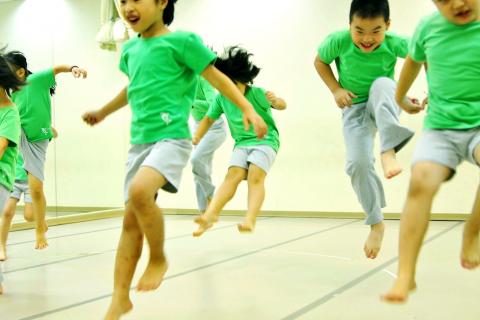
Photo courtesy of Cloud Gate Dance School
Cloud Gate Dance School has classes for children as young as three, and emphasizes that parents should participate in these classes, making them a mutual learning process. At the other end of the spectrum, there are classes for the elderly, teaching them to be more comfortable and more confident about their bodies. For young people, there are some more technical dance and martial arts classes that teach greater physical control.
“A lot of it is about confidence and the ability to relax,” Hsieh said. “When we joined Cloud Gate, even though we were already all grown up, we still needed Lin Hwai-min (林懷民, founder of Cloud Gate Dance Theatre) to tell us that we needed to present ourselves with confidence. Thinking back, it may be that Chinese culture over-emphasizes humility at the expense of confidence … It is a feature of Chinese culture that has both a good side and a bad side, and while we might be modest, it also makes us less able to express ourselves,” Hsieh said. For Hsieh, the primary aim of all the classes at the dance school is to redress that balance.
A particularly important part of what Cloud Gate Dance School tries to achieve is to develop a joy in physical activity and contact, and this is particularly apparent in children’s classes, which emphasize play. “We want to convey a joy in physical activity and contact with the physical world,” Hsieh said, pointing out to the use of all kinds of found props, including newspapers and cardboard boxes, which become valuable teaching tools as little kids find ways of making these into toys.
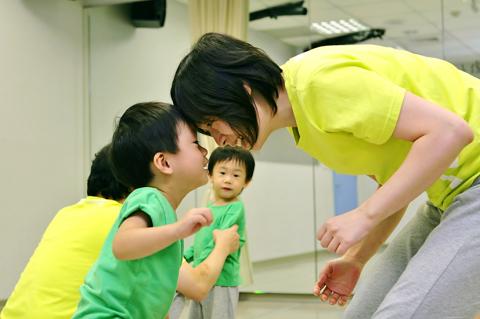
Photo courtesy of Cloud Gate Dance School
While most of the teachers at the school are professional dancers, Hsieh pointed out a terrible irony in Taiwan’s formal dance education that she finds particularly saddening.
“Formal education is such a high-pressure environment in Taiwan,” Hsieh said.
“Everything is about scores, and at dance school, the focus is in getting a good place at university … Many of the schools use really harsh methods to make sure their students progress, so much so that many students drop out of dance soon after they graduate. They have simply lost all their passion for dance.”
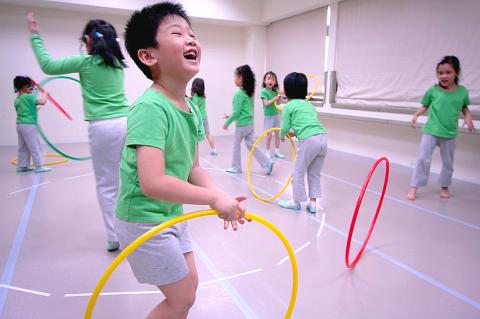
Photo courtesy of Cloud Gate Dance School
According to her mother, 14-year-old Li Ya-hsuan (李亞璇) might have stopped going to Cloud Gate’s dance class, as she considered the prospect of a junior high school workload. But Li, who aspires to be a professional dancer, told her mother that Cloud Gate was a “weekly boost to her passion for dance.”
“Dance encompasses all movement. As professional dancers, the simplest movement is part of dance. People need to understand that dance covers a huge spectrum, it’s not just ballet. Everyone can dance ... Children love to dance, and we want to preserve this passion into later life,” Hsieh said. As a result, technical achievement is much less a priority than spontaneous expression and a connection with one’s own body.
From its beginnings 15 years ago as a single class aimed at infants, Cloud Gate Dance School has completed a cycle of development that has seen vast changes in the community at large. “We now deal with a whole new generation of students and parents,” Hsieh said, “and our approach is constantly changing.”
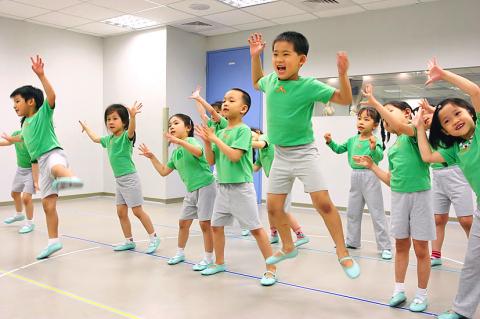
Photo courtesy of Cloud Gate Dance School
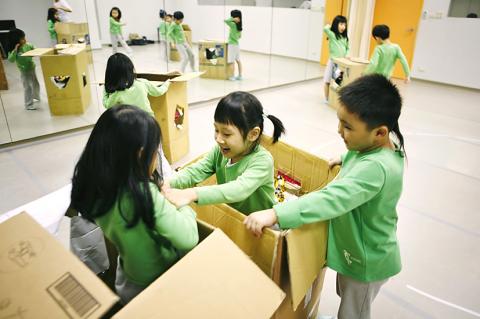
Photo courtesy of Cloud Gate Dance School

Towering high above Taiwan’s capital city at 508 meters, Taipei 101 dominates the skyline. The earthquake-proof skyscraper of steel and glass has captured the imagination of professional rock climber Alex Honnold for more than a decade. Tomorrow morning, he will climb it in his signature free solo style — without ropes or protective equipment. And Netflix will broadcast it — live. The event’s announcement has drawn both excitement and trepidation, as well as some concerns over the ethical implications of attempting such a high-risk endeavor on live broadcast. Many have questioned Honnold’s desire to continues his free-solo climbs now that he’s a

As Taiwan’s second most populous city, Taichung looms large in the electoral map. Taiwanese political commentators describe it — along with neighboring Changhua County — as Taiwan’s “swing states” (搖擺州), which is a curious direct borrowing from American election terminology. In the early post-Martial Law era, Taichung was referred to as a “desert of democracy” because while the Democratic Progressive Party (DPP) was winning elections in the north and south, Taichung remained staunchly loyal to the Chinese Nationalist Party (KMT). That changed over time, but in both Changhua and Taichung, the DPP still suffers from a “one-term curse,” with the

Lines between cop and criminal get murky in Joe Carnahan’s The Rip, a crime thriller set across one foggy Miami night, starring Matt Damon and Ben Affleck. Damon and Affleck, of course, are so closely associated with Boston — most recently they produced the 2024 heist movie The Instigators there — that a detour to South Florida puts them, a little awkwardly, in an entirely different movie landscape. This is Miami Vice territory or Elmore Leonard Land, not Southie or The Town. In The Rip, they play Miami narcotics officers who come upon a cartel stash house that Lt. Dane Dumars (Damon)

Today Taiwanese accept as legitimate government control of many aspects of land use. That legitimacy hides in plain sight the way the system of authoritarian land grabs that favored big firms in the developmentalist era has given way to a government land grab system that favors big developers in the modern democratic era. Articles 142 and 143 of the Republic of China (ROC) Constitution form the basis of that control. They incorporate the thinking of Sun Yat-sen (孫逸仙) in considering the problems of land in China. Article 143 states: “All land within the territory of the Republic of China shall